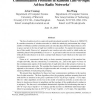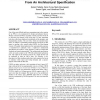2542 search results - page 123 / 509 » One step ahead |
ARCS
2008
Springer
13 years 11 months ago
2008
Springer
: The task of the creatures in the "creatures' exploration problem" is to visit all empty cells in an environment with a minimum number of steps. We have analyzed th...
CORR
2010
Springer
13 years 9 months ago
2010
Springer
Abstract--This paper proposes a method for deriving formal specifications of systems. To accomplish this task we pass through a non trivial number of steps, concepts and tools wher...
IAT
2007
IEEE
14 years 3 months ago
2007
IEEE
Practical reasoning (PR), as advocated by philosophers is concerned by reasoning about what agents should do. It follows mainly two steps. A deliberation one for identifying the g...
SAGA
2007
Springer
14 years 3 months ago
2007
Springer
The line-of-sight networks is a network model introduced recently by Frieze et al. (SODA’07). It considers scenarios of wireless networks in which the underlying environment has...
FPGA
2003
ACM
14 years 2 months ago
2003
ACM
One of the most difficult and time-consuming steps in the creation of an FPGA is its transistor-level design and physical layout. Modern commercial FPGAs typically consume anywher...


